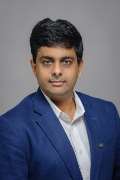Other Seminar
Regenerating Cardiac Tissues – Reflecting on Lessons Learnt from Heart Valves
This event is free and open to the publicAdd to Google Calendar

Zoom Link: https://bostonu.zoom.us/j/93315594357?pwd=eE4wQS9lZjA2aloyMkQ2dG5CS21kZz09
Meeting ID: 933 1559 4357 Passcode: 689715
ABSTRACT
In CELL-MET we recently embarked on mechanical conditioning studies on iPSC Cardiomyocytes-seeded scaffolds. At this time, we believed this would be a good moment to reflect on lessons learnt in our extensive research focused on valves with regenerative capacities. Young children with critical heart valve defects (congenital or acquired) have no effective treatment options. Commercially-available valve therapies have major limitations and do not come in small sizes. Mechanical valves are commonly used, but require long-term anti-coagulant therapy, which is dangerous for young children. Homografts or bio-prosthetic valves are occasionally used but are prone to calcification, leading to regurgitation. In the pediatric population, repetitive valve replacement surgeries are required, because available prosthetic valves do not accommodate somatic growth. Thus, current prospects in treating critical valve defects in children are faced with an overall grim prognosis for survival. In theory, the ability to grow a valve in vitro using stem cell progenitors and appropriate scaffolding materials, i.e., valves with regenerative capacities, for subsequent implantation could potentially overcome all the shortcomings of existing treatment strategies. Despite this appeal however, specific scaffold selection and/or biomechanical environments are needed to enhance the valve phenotype for effective in vivo integration. In our laboratory, we have focused our efforts on flow-based biomechanical conditioning of stem-cell-seeded scaffolds to engineer valve tissues. In addition, we have utilized porcine small intestinal submucosal (PSIS) bioscaffolds as a substrate for supporting de novo valvular tissue growth in vivo. Important findings in our pursuit of valves with regenerative capacities and how this has helped in our experimental design in cardiac regeneration within CELL-MET will be presented. Finally, important challenges that were encountered in our valve experience, which potentially need to also be considered in the development of engineered cardiac tissues will be discussed.
BIOGRAPHY
Dr. Sharan Ramaswamy earned a PhD in Biomedical Engineering (BME) from the University of Iowa in 2003. Following a post-doctoral fellowship at the NIH and a research faculty position at the University of Pittsburgh, Dr. Ramaswamy joined the BME department at Florida International University (FIU) in December 2009 as an Assistant Professor. He is currently a tenured Associate Professor at FIU. His research expertise is in the areas of Cardiovascular Regenerative Medicine, Mechanobiology and Mechanics. He directs the Cardiovascular Therapeutics Laboratory (CV- PEUTICS LAB) at FIU. He has numerous scientific articles published in his discipline in leading journals, proceedings and book chapters. His work has been funded by the American Heart Association (AHA), the Florida Heart Research Foundation, the National Science Foundation, private industry and academia. Apart from Research and Mentorship awards that he has received at FIU, Dr. Ramaswamy was recognized by the Hind Rattan award for his scientific achievements in 2017 and by the William R. Jones Outstanding mentor award, by the Florida Education Fund. He is a Fellow of the AHA and the American Society of Mechanical Engineering (ASME). In addition, he served as a Fulbright Specialist to the Karolinska Institute, Sweden in the summer of 2019. He is an advisor to several graduate and undergraduate students and has participated in significant outreach efforts to high school students in the Miami-Dade County Public School System in Miami, Florida. Dr. Ramaswamy currently serves as a Faculty Fellow for the Office to Advance Women, Equity and Diversity (AWED) at FIU.
 MENU
MENU 
